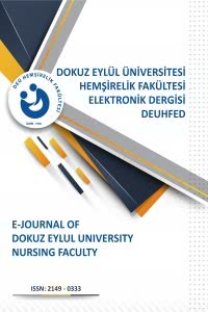Hemşirelik Öğrencilerinin Sosyal, Duygusal Yalnızlık Düzeyleri ve Yeme Davranışlarının İncelemesi
Hemşirelik öğrencileri, Sosyal ve duygusal yalnızlık, Yeme bozuklukları.
Investigation of Social, Emotional Loneliness Levels and Eating Behaviors of Nursing Students
___
- 1. Vasileiou K, Barnett J, Barreto M, Vines J, Atkinson M, Long K, Bakewell L, Lawson S, Wilson M. Coping with loneliness at University: a qualitative interview study with students in the UK. Mental Health & Prevention. 2019 Mar 1;13:21-30.2. Diehl K, Jansen C, Ishchanova K, Hilger-Kolb J. Loneliness at universities: determinants of emotional and social loneliness among students. International journal of environmental research and public health. 2018 Sep;15(9):1865. 3. Levine MP. Loneliness and eating disorders. The Journal of psychology. 2012 Jan 1;146(1-2):243-57.4. Luhmann M, Hawkley LC. Age differences in loneliness from late adolescence to oldest old age. Developmental Psychology. 2016 Jun;52(6):943.5. Qualter P, Vanhalst J, Harris R, Van Roekel E, Lodder G, Bangee M, Maes M, Verhagen M. Loneliness across the life span. Perspectives on Psychological Science. 2015 Mar;10(2):250-64.6. Yurtsever SS, Sütcü ST. Algılanan Ebeveynlik Biçimleri ile Bozulmuş Yeme Tutumu Arasındaki İlişkide Erken Dönem Uyumsuz Şemaların ve Duygu Düzenleme Güçlüğünün Aracı Rolü. Türk Psikoloji Dergisi. 2017 Dec 1;32(80):20-43.7. Tam CK, Ng CF, Yu CM, Young BW. Disordered eating attitudes and behaviours among adolescents in Hong Kong: prevalence and correlates. Journal of paediatrics and child health. 2007 Dec;43(12):811-7.8. Serin Y, Şanlıer N. Duygusal yeme, besin alımını etkileyen faktörler ve temel hemşirelik yaklaşımları. Psikiyatri Hemşireliği Dergisi. 2018;9(2):135-46.9. Parra-Fernández ML, Rodríguez-Cano T, Onieva-Zafra MD, Perez-Haro MJ, Casero-Alonso V, Fernández-Martinez E, Notario-Pacheco B. Prevalence of orthorexia nervosa in university students and its relationship with psychopathological aspects of eating behaviour disorders. BMC psychiatry. 2018 Dec;18(1):364.10. Dell’Osso L, Carpita B, Muti D, Cremone IM, Massimetti G, Diadema E, Gesi C, Carmassi C. Prevalence and characteristics of orthorexia nervosa in a sample of university students in Italy. Eating and Weight Disorders-Studies on Anorexia, Bulimia and Obesity. 2018 Feb 1;23(1):55-65.11. Arslantaş H, Adana F, Öğüt S, Ayakdaş D, Korkmaz A. Hemşirelik öğrencilerinin yeme davranışları ve ortoreksiya nervoza (sağlıklı beslenme takıntısı) ilişkisi: Kesitsel bir çalışma. Journal of Psychiatric Nursing/Psikiyatri Hemsireleri Dernegi. 2017 Nov 1;8(3).12. Bo S, Zoccali R, Ponzo V, Soldati L, De Carli L, Benso A, Fea E, Rainoldi A, Durazzo M, Fassino S, Abbate-Daga G. University courses, eating problems and muscle dysmorphia: are there any associations?. Journal of translational medicine. 2014 Dec;12(1):221.13. Duran S. Sağlık Yüksekokulu öğrencilerinde ortoreksiya nervoza (sağlıklı beslenme takıntısı) riski ve etkileyen faktörler. Pamukkale Tıp Dergisi. 2016;(3):220-6.14. DiTommaso E, Spinner B. The development and initial validation of the Social and Emotional Loneliness Scale for Adults (SELSA). Personality and Individual Differences. 1993 Jan 1;14(1):127-34.15. Çeçen AR. The Turkish short version of the Social and Emotional Loneliness Scale for Adults (SELSA-S): Initial development and validation. Social Behavior and Personality: an international journal. 2007 Jan 1;35(6):717-34.16. Aydemir Ö, Köksal B, Sapmaz SY, Yüceyar H. Kadın üniversite öğrencilerinde REZZY Yeme Bozuklukları Ölçeği Türkçe formunun güvenilirlik ve geçerliliği/Reliability and validity of Turkish form of SCOFF Eating Disorders Scale. Anadolu Psikiyatri Dergisi. 2015 Apr 1;16:31.17. Donini LM, Marsili D, Graziani MP et al. Orthorexia nervosa: Validation of a diagnosis questionnaire. Eat. Weight Disord. 2005 10 (June), e28-e32.18. Arusoğlu G, Kabakçi E, Köksal G, Merdol TK. Ortoreksiya Nervoza ve Orto-11'in Türkçeye Uyarlama Çalışması. Turk Psikiyatri Dergisi. 2008 Sep 1;19(3).19. Vijayalakshmi P, Thimmaiah R, Gandhi S, BadaMath S. Eating attitudes, weight control behaviors, body ımage satisfaction and depression level among Indian medical and nursing undergraduate students. Community Mental Health Journal. 2018 Nov 1;54(8):1266-73.20. Celik S, Ugur BA, Aykurt FA, Bektas M. Eating attitudes and related factors in Turkish nursing students. Nursing and midwifery studies. 2015 Jun;4(2).21. Pengpid S, Peltzer K. Risk of disordered eating attitudes and its relation to mental health among university students in ASEAN. Eating and Weight Disorders-Studies on Anorexia, Bulimia and Obesity. 2018 Jun 1;23(3):349-55.22. Ab Hamid MR, Azman NN, Said N, Rahman AN. Orthorexia nervosa and the quality of life among health sciences students in Universiti Teknologi MARA, Selangor. Environ Behav Proc J. 2018 Mar 2;3(7):121-6.23. Okumuşoğlu S. The relationship of orthorexic tendencies with eating disorder tendencies and gender in a group of university students. Curr Res Educ. 2017;3(3):105-15.24. Kutlu Y, Altun M. Ergenlerin yeme davranışları ile ilgili görüşleri: Niteliksel Çalışma. Florence Nightingale Hemşirelik Dergisi. 2015;23(3):174-84.25. Salimia A, Jowkar B. Personality predispositions and loneliness in adolescence. Procedia-Social and Behavioral Sciences. 2011 Jan 1;29:296-9.26. Pace U, D'Urso G, Zappulla C. Negative eating attitudes and behaviors among adolescents: The role of parental control and perceived peer support. Appetite. 2018 Feb 1;121:77-82.27. Durna Z, Oğuz G. Kronik hastalıklar ve yönetimi. Aştı N, editör. Kronik hastalıklarda bakımın yönetiminde bütüncü yaklaşımla ekip çalışması. Ankara: Türkiye Klinikleri; 2018. p.1-10.28. Kong LN, Hu P, Yao Y, Zhao QH. Social support as a mediator between depression and quality of life in Chinese community-dwelling older adults with chronic disease. Geriatric Nursing. 2018 Nov 29:S0197-4572(18)30434-8.29. Çelik S, Kelleci MK, Dilek Av, Temel E. Tip 1 diyabetli genç yetişkinlerin hastalığa psikososyal uyumları ve stresle başa çıkma tarzları. Florence Nightingale Hemşirelik Dergisi. 2015;23(2):105-15.
- ISSN: 2149-0333
- Yayın Aralığı: 4
- Başlangıç: 2008
- Yayıncı: Dokuz Eylül Üniversitesi Hemşirelik Fakültesi
Türkiye’de Demans ile İlgili İnternet Taramalarının Trend Analizi
Burcu AKPINAR SÖYLEMEZ, Özlem KÜÇÜKGÜÇLÜ
Hemşirelik Öğrencilerinin Sosyal, Duygusal Yalnızlık Düzeyleri ve Yeme Davranışlarının İncelemesi
BURCU CENGİZ, Dijle AYAR, Gülcihan ARKAN, İlknur BEKTAŞ
SİNEM YALNIZOĞLU ÇAKA, Nursan ÇINAR
Arzu ÖZYÜREK, Meltem KÜRTÜNCÜ, Esin SEZGİN, Aylin KURT
An Analysis of Trends in Internet Searches about Dementia in Turkey
BURCU AKPINAR SÖYLEMEZ, ÖZLEM KÜÇÜKGÜÇLÜ
Multipl Sklerozlu Hastaların Tedavi Yönetimi ve Hemşirelik Yaklaşımları
